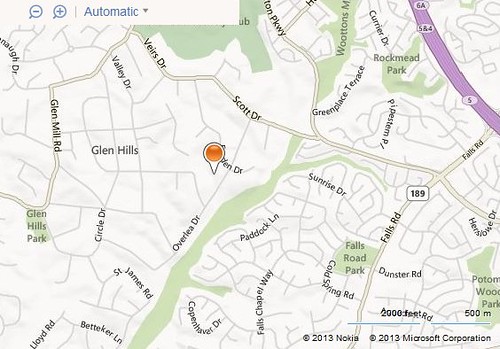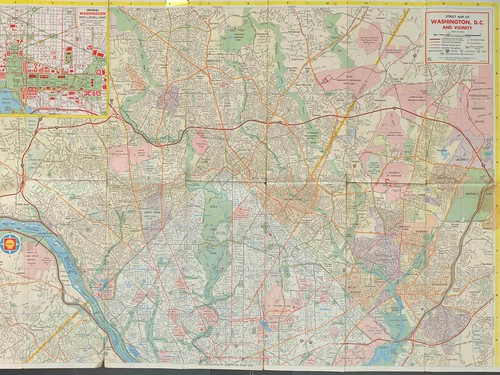What the f*** #1: giving responsibility for roads to abutting property owners
Sometimes I can be pretty oblivious to humor, so I am not sure if today's letter to the editor in the Washington Post, "A modest proposal for roads," is serious.
In the letter a Rockville resident suggests that she and her neighbors should take on the responsibility for maintaining their local street, and can mix up asphalt and make repairs with a phalanx of equipment from her neighbors like lawn mowers and wheelbarrows.
Because this year is the 150th anniversary of the Battle at Gettysburg between the Union and the Confederates, we decided to go up there and read a bit about the battle and the Civil War a little more generally. Of course, I am more interested in cultural studies and revisionist history approaches, so books like Confederate Nation by Emory Thomas are on my reading list.
Suzanne and I often discuss about how many of the cleavages in US society present in the past are still with us. For example, the way that Republicans demonize President Obama is no different than how FDR was demonized during WWII, at least according to the book, When Washington Went to War.
It is amazing to me that the justification for the secession of the "Confederate" states was "states rights," and that the individual states were the fundamental political unit, with an identity and a power greater than that of the nation as a whole.
Fundamentally, the same position is argued by Republicans now, with regard to the Affordable Health Care Act and many other positions.
One of the mottoes of the US is "E Pluribus Unum" which means "out of many, one."
When the US was first created it was organized as a "confederacy" of states, structured by the Articles of Confederation. It didn't workout so well, and the Constitution was written and passed later, to cure the problems that resulted from a confederated form of government. The Constitution created a national government structure, with states being subsidiary to the federal government.
I believe that we should be treated the same regardless of where we live, that the 14th Amendment of the Constitution "guaranteeing" "equal protection under the law" is one of the most important clauses ever, focused on our rights as citizens of a nation more than our rights as citizens of states, especially when rights are restricted by differentiated practices of individual states.
I myself consider myself a citizen of the USA first and foremost, and secondarily as a resident of a state (DC isn't one) and city, town, or county.
The "states rights" or "confederate" position is absolutely opposite of "out of many, one," instead it is "out of one, many":
Ex uno plures.
Answering this question in favor of the federal government isn't a matter of our becoming vassals of an all powerful government. Fundamentally, government is us, "We, the people."
The bridge on New Hampshire Avenue in Takoma Park is being reconstructed over Sligo Creek. It's not a task that a typical group of neighbors are able to accomplish.
But some tasks are better accomplished working together, "collectively". And among many such things includes creating a "transportation network" including roads, which benefits all of us, because it aids our ability to get around.
My street is an east-west connector used by many more people than those who live on it--including the local police station house, which abuts the street--should only the people who live on the street pay to build and maintain it?
How the transportation network should be managed isn't as simple as repairing the crack in the road. A national network with international connections necessarily involves the federal government, and sub-national transportation involves other levels of government (see "Second iteration, idealized national network for high speed rail passenger service").
Besides considering whether or not as individuals we have the skill and capacity to fix a crack in the road or build a bridge, maybe when like Margaret Cervarich, you live in a place served by a meandering road network, you don't get the concept that your street is part of a network that is used by more than just the people who live nearby. Just as the sidewalk in front of your house serves more than just your household, so does the road network. Or maybe she is fine with "main roads" being maintained by the "state".
The map of Rockville where Margaret Cervarich lives.

A map of DC's road network in the Upper North part of the city (Shell map, 1966).

Labels: infrastructure, law and the legal process, participatory democracy and empowered participation, provision of public services, transportation planning, US Constitution




6 Comments:
I took the letter as satire. Haven't read the WP comments yet, but I'm sure tons of people took the bait.
I expect you're right. WRT the broader proposal, Cuccinelli is right to want to devolve responsibility for roads to the counties, as I have written about before.
It would create a tough little issue though. In VA cities are independent from the counties in which they are located. I think it would make sense that the overall county should have responsibility for the roads, on an efficiency basis, although I could see an exception for Richmond and some of the other larger cities in the Commonwealth.
In Virginia, roads were authorized for construction by a County Road order. Here is a report of the History of Fairfax County. Those that petitioned for a road were also committed to maintain it. I think the story is that road taxes came about because people were too busy to actually do that work or send their people, so they just said - send me my share of the bill. There are reports for the other county areas.
http://www.virginiadot.org/vtrc/main/online_reports/pdf/03-r19.pdf
I am endeavouring this kind of facts and figures currently i got it and that i bookmarker you simply due to your composing skills.This item are some things which will facilitate Maine with my class allotment. It assisted Maine to higher perceive another edge of this subject. Thanks..
I lately chanced on your periodical and are reading on. i presumed i'd depart my 1st commentary. I don’t apprehend what to mention except that I actually have relished reading.
Thanks nice providing information.
Post a Comment
<< Home